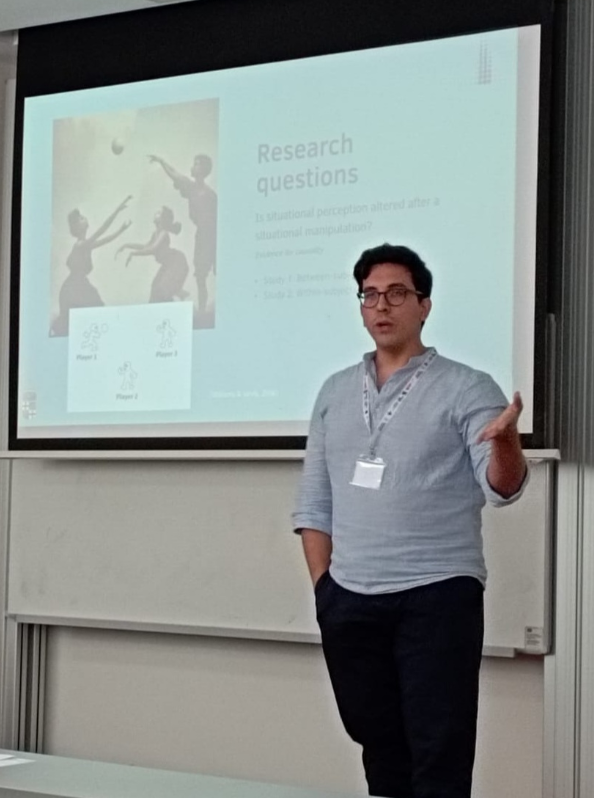1. Can you tell us a little bit about yourself and what got you interested in personality psychology?
I am David Saeteros, a native of Ecuador, a country known for its exuberant natural diversity. I grew up in a large family that valued academic excellence and inspired me to pursue an academic career. I studied psychology at the University of Guayaquil, a public university where most of my courses focused on social and community psychology, influenced by cultural-historical approaches. While I appreciate the education I received there, Ecuador faces the challenge of incorporating advanced methods for studying psychology within its university system.
Since my university did not offer this formation, I had to study fundamental concepts like statistics and research methods independently. Eventually, I sought and found assistance, delving into cognitive and experimental psychology, which introduced me to research in psychology. Although an exciting field, experimental psychology is definitely not my passion. For a long time, I had a lingering question about the elements shaping a person’s identity. This led me to the field of personality psychology and, eventually, to the Individual Differences Lab from the University of Barcelona, a pivotal element in my research career and where I am currently conducting my doctoral studies.
2. What are you currently interested in/working on regarding personality psychology?
Currently, I’m immersed in two exciting projects. Firstly, I’m exploring and revising the lexical hypothesis, using cutting-edge Natural Language Processing techniques. This hypothesis is based on the idea that we can use computers to understand language and, subsequently, understand differences in human personality as salient individual differences that are bound to appear in language use and content. I firmly believe the lexical space offers more insights into personality psychology than current dimensionally-reduced Big Few models can provide. This project is a real thrill for me, and I’m genuinely enjoying the process!
The second project is about exploring if and to what extent personality models are different in Latin American populations. I’m challenging the suitability of the Big Five in this context, and I propose a comprehensive lexical study based on the Latin American lexicon. My belief in a distinct personality structure in Latin America stems from an ongoing Big Five Inventory – 2 scale validation project, and on psychometric research conducted both in Bolivia (Gurven et al., 2013) and Peru (Hughes et al., 2020). An innovative twist in this project is leveraging Natural Language Processing techniques like the Natural Language Toolkit and Part-of-speech for the meticulous task of text corpus curation and adjective selection.
Cross-cultural studies of this nature are evidence that different cultures leverage different “coordinates” of the lexical space. Personality, as a universal concept, can be captured by Large Language Models, but self-reports only capture parts of it. This implies that the Big Five is not a universal model, but a cultural one.
3. Are there any specific findings in the field that you are excited about?
I am genuinely excited about predicting and classifying personality using Natural Language Processing (NLP). I’m confident that in the coming years, we will move beyond classic personality data collection methods, such as questionnaires, and adopt better tools like chat bots, records of mobile and digital behavior, and real behaviors observed in virtual reality scenarios.
4. Are there any specific movements/shifts in the direction of the field that you would like to see in the next 5 years? Where would you like to see yourself, as an early career researcher in the next 5 years?
I’m eager to see the field of personality psychology build a more robust theory of human personality. Delving into innovative approaches such as McAdams’ new Big Five and Colin DeYoung’s cybernetic theory of personality truly inspires me. In the next five years, I hope to make a substantial contribution for a more robust theory of human personality while factoring in the cultural diversity found across the globe.
There is a quote by Colin DeYoung that I would propose every personality psychologist to ponder: “An adequate theory of personality must explain not only how individuals differ from each other in their persisting patterns of emotion, motivation, cognition, and behavior, but also why. In other words, it must be an explanatory, causal theory” (DeYoung, 2015).
5. Do you have any tips for peer early career researchers?
For early career researchers, my advice is to find an environment where they can: secure a mentor and research group well-versed in advanced methodologies, immerse themselves in extensive learning and some teaching, and approach literature with an open mind to discover their niche. Dive deep into your research topic beyond statistical metrics, do not limit your thinking to them although you should know them by heart, involve yourself from various perspectives, and embrace scepticism and questioning. Only by staying foolish and doubting almost everything can we find new avenues that push the field in the right directions. Because, at its core, scientific thinking is all about embracing doubt.
David Saeteros
